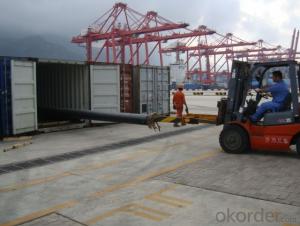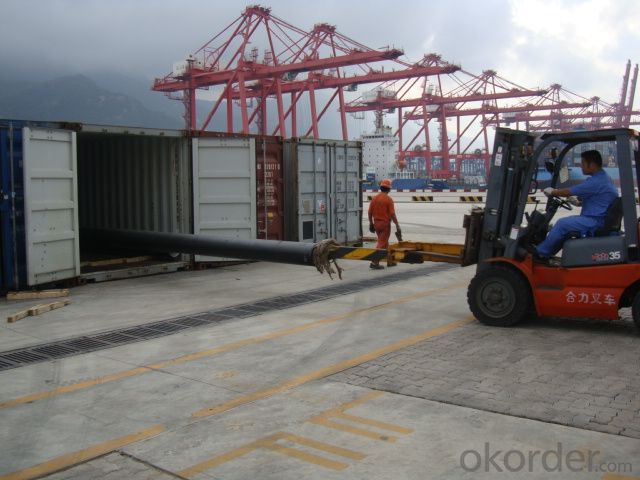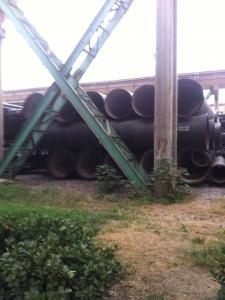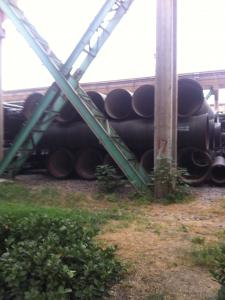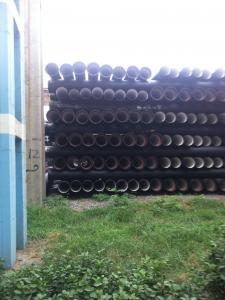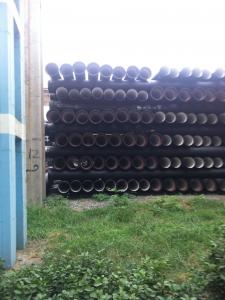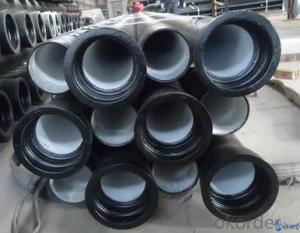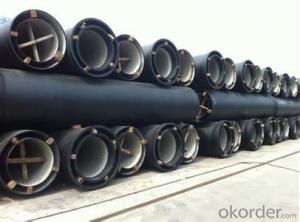DUCTILE IRON PIPES AND PIPE FITTINGS k9 CLASS DN200
- Loading Port:
- Tianjin
- Payment Terms:
- TT OR LC
- Min Order Qty:
- 25 pc
- Supply Capability:
- 30000 pc/month
OKorder Service Pledge
OKorder Financial Service
You Might Also Like
Material : Ductile Cast Iron
Size Range : DN 80mm to DN 2000mm
Unit Effective Length : 6m or 5.7m
Manufacture Standard: ISO 2531:1998/ EN 545:2006/EN 598:2007
Annual capacity : 200,000 tons
Coating Exterior: Zinc 130g/m2 according to ISO 8179-1 and bitumen coating 70 microns.
Cement Interior: Portland Cement/ High Alumina Cement/ Sulphate Resisting Cement Lining according to ISO 4179
Special requirements on external coating and internal lining can be applied
We also provide accessories such as SBR/EPDM rubber gaskets, lubricant paste, pipe caps, PE sleeves, etc.
Additional Parts:
Each pipe is strictly inspected according to related standard to ensure permanently high performance.
Easy Installation at site and service free for life
Long Service Lifespan
Quotation will arrive you within 24hours once we get your inquiry.
We guarantee offering you a competitive price.
A copy of original inspection reports of pipes will be offered after shipment.
Photos of loading process will be sent to the customer after shipment effect.
We will follow-up the delivery progress after shipment effect and update to the customer on weekly basis.
- Q: What are the differences between ductile cast iron pipes and centrifugal ductile iron pipes?
- Centrifugal casting is a casting method. Ball milling cast iron pipe is a kind of material.
- Q: How does ductile iron pipe perform in extreme temperatures?
- Ductile iron pipe is renowned for its exceptional performance in extreme temperatures, thanks to its unique composition and manufacturing process. Its structural integrity remains uncompromised, allowing it to endure both high and low temperatures without issue. When it comes to high temperatures, ductile iron pipe showcases remarkable heat resistance. It can withstand temperatures of up to 1000 degrees Fahrenheit, making it perfect for applications involving hot liquids or gases, such as steam pipelines or industrial processes. Its strength and thermal stability enable it to maintain its shape and structural integrity even under extreme heat conditions, guaranteeing long-term reliability and safety. Similarly, ductile iron pipe excels in low-temperature environments. It can brave sub-zero temperatures without becoming brittle or prone to cracking, a common problem with materials like cast iron. This makes ductile iron pipe an ideal choice for applications in cold climates, such as water distribution systems in freezing temperatures. Moreover, the ability of ductile iron pipe to resist thermal expansion and contraction is another advantage in extreme temperatures. It has a low coefficient of thermal expansion, meaning it expands and contracts less compared to other materials. This property minimizes stress on the pipe, reducing the risk of leaks or failures caused by temperature fluctuations. In conclusion, ductile iron pipe demonstrates outstanding performance in extreme temperatures. Its heat resistance, ability to withstand low temperatures, and resistance to thermal expansion and contraction make it a reliable option for various applications, ensuring safe and efficient operations even in challenging environments.
- Q: Do ductile iron pipes require internal lining for potable water applications?
- Yes, ductile iron pipes do require internal lining for potable water applications. This is because the iron used in these pipes can react with the water and potentially contaminate it. Internal lining acts as a barrier between the water and the iron, preventing any chemical reactions and ensuring the water remains safe for consumption.
- Q: Can ductile iron pipe be used for hot water applications?
- Yes, ductile iron pipe can be used for hot water applications. Ductile iron pipe is known for its strength, durability, and high resistance to corrosion, which makes it suitable for a wide range of applications, including hot water systems. It can handle high temperatures and pressure, making it a reliable choice for transporting hot water. Additionally, ductile iron pipe's thermal conductivity properties allow for efficient heat transfer, ensuring that hot water is delivered effectively throughout the system. Therefore, when considering materials for hot water applications, ductile iron pipe is a suitable option.
- Q: What is cast iron pipe?
- Divided into gray cast iron pipe and nodular cast iron pipe according to different material. According to the interface form, it is divided into flexible interface, flange interface, self anchored interface, rigid interface and so on. Among them, the flexible iron pipes rubber sealing ring; flange interface cast iron pipe flange fixed in the rubber pad, the flange gasket sealing; rigid interface cast iron pipe socket is large, straight pipe is inserted, sealed with cement, this technology has been basically eliminated.
- Q: What's the advantage of FCD50 ductile iron?
- The threading pipe threading pipe application of flame retardant PVC line pipe, the pipe wall surface should be smooth, the wall thickness required was not broken finger pinch strength, but also should have the certificate. You can also use the national standard galvanized pipe as threading pipe.
- Q: What are the typical lengths of ductile iron pipes?
- The typical lengths of ductile iron pipes can vary depending on the specific project requirements and industry standards. However, commonly used lengths for ductile iron pipes range from 18 feet (5.5 meters) to 20 feet (6 meters). These lengths are suitable for various applications such as water distribution, wastewater systems, and industrial pipelines. It is important to note that custom lengths can also be manufactured to meet specific project needs.
- Q: Can ductile iron pipes be used in areas with high groundwater levels?
- Yes, ductile iron pipes can be used in areas with high groundwater levels. Ductile iron pipes are known for their durability and strength, making them suitable for various underground applications, including areas with high water tables. They have a robust construction that can withstand external pressures and corrosive environments, making them an excellent choice for water and wastewater systems in such areas.
- Q: Do ductile iron pipes require concrete encasement for support?
- No, ductile iron pipes do not typically require concrete encasement for support. Ductile iron pipes have sufficient strength and flexibility to support their own weight and withstand typical loads without the need for additional concrete encasement.
- Q: Are there any specific standards or specifications for ductile iron pipes?
- Ductile iron pipes have specific standards and specifications that must be adhered to. The American Water Works Association (AWWA) and the International Organization for Standardization (ISO) are responsible for establishing the most commonly used standards for these pipes. AWWA has developed the AWWA C151 standard, which covers everything from design and manufacturing to testing, installation, and maintenance requirements for ductile iron pipes used in water and wastewater applications. This standard outlines the materials, dimensions, and mechanical properties of the pipes, as well as the necessary coatings and linings. Similarly, ISO has created the ISO 2531 standard, which provides guidelines for the design, manufacturing, testing, and installation of ductile iron pipes in water and wastewater systems. This standard addresses various aspects, including dimensions, mechanical properties, coatings, and linings. In addition to these well-known standards, there may be other regional or national standards that are specific to certain countries or regions. These standards typically align with the AWWA and ISO standards or may have additional requirements that are specific to local conditions or regulations. Compliance with these standards ensures that ductile iron pipes meet the required quality and performance standards. It also promotes the interoperability and compatibility of ductile iron pipes across different systems and countries, which in turn enables reliable and efficient water distribution and wastewater management.
Send your message to us
DUCTILE IRON PIPES AND PIPE FITTINGS k9 CLASS DN200
- Loading Port:
- Tianjin
- Payment Terms:
- TT OR LC
- Min Order Qty:
- 25 pc
- Supply Capability:
- 30000 pc/month
OKorder Service Pledge
OKorder Financial Service
Similar products
Hot products
Hot Searches
Related keywords
